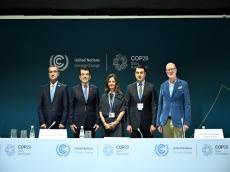|
|
TODAY.AZ / Arts & Entertainment
Baku hosts panel session on "Culture for Climate: Engaging Youth to Effect Behavioural Change"
20 November 2024 [15:41] - TODAY.AZ

By Laman Ismayilova
A panel session themed Culture for Climate: Engaging Youth to Effect Behavioural Change has been held in Baku as part of the 2024 United Nations Climate Change Conference (COP29), Azernews reports citing the Culture Ministry.
The session was jointly organized jointly by the Heydar Aliyev Foundation, IDEA (International Dialogue for Environmental Protection) Public Union, ICESCO, and the Azerbaijan Culture Ministry.
Initially, Martin Newman, founder of the "Newman Partnership" organization, provided information about the topic of the panel and introduced the speakers.
A video presentation concerning the "Culture for Climate" (C4C) initiative proposed by Azerbaijan was also shown.
Following this, the Director-General of the International Centre for the Study of the Preservation and Restoration of Cultural Property (ICCROM), Aruna Francesca, the Director-General of ICESCO, Salim Bin Mohammed Al-Malik, Princess Dana Firas of Jordan, UNESCO Goodwill Ambassador, and President of the Petra National Trust, as well as member of the Azerbaijani Parliament and head of the International Relations Department of the Heydar Aliyev Foundation Soltan Mammadov addressed the panel session.
In their speeches, they touched upon the inspiring and transformative potential of cultural projects and initiatives in this area. The role of the Friends Group on Culture-Based Climate Action (GFCBCA) and the "Culture for Climate" initiative in showcasing efforts in this area and enhancing the power of culture as a catalyst for behavioral change worldwide was emphasized.
It was noted that research indicates that approximately 72 percent of greenhouse gas emissions can be attributed to individual behaviors and decisions.
This highlights that definitive changes in human behavior should be regarded as one of the essential tools in combating the climate crisis, alongside ambitious targets and commitments for emissions reduction and financial mechanisms for alleviating the impacts of climate change.
Culture, which has played a central role in transmitting the values that guide our behaviors throughout history, remains significant at local, national, regional, and global levels in shaping and modeling fundamental behavioral changes today. It is now impossible to effectively combat the climate crisis without leveraging the influence of culture. Although certain steps have been taken in this area so far, there is a need for more impactful projects, and a favorable opportunity has emerged for fundamental changes.
The active participation of the Friends Group on Culture-Based Climate Action, which has been increasing in membership, including relevant state agencies and NGOs, has been more pronounced during COP29. A significant outcome of the Second High-Level Meeting of Culture Ministers held on November 15 as part of COP29 was the successful acceptance of a technical mandate for the aforementioned group.
During the discussions, it was also mentioned that during its presidency of the COP, the Azerbaijani government has significantly supported the promotion of innovative cultural projects with the potential to change human behaviors regarding the environment, through the advancement of the "Culture for Climate" initiative, which serves as a new platform for research and dialogue in climate discussions.
At the end of the event, participants' questions were answered, and a commemorative photo was taken.
URL: http://www.today.az/news/entertainment/254955.html
 Print version
Print version
Connect with us. Get latest news and updates.
See Also
- 08 April 2025 [14:57]
Training for library staff to be held in Ganja - 08 April 2025 [13:24]
Garabagh University aims to become hub for education and innovation - 08 April 2025 [13:07]
Exhibition "Second Life" to open at Carpet Museum - 08 April 2025 [12:35]
Baku to host Qatar Culture Days - 07 April 2025 [13:37]
Azerbaijan honors 119 years of Molla Nasreddin satirical magazine - 07 April 2025 [13:00]
Ganja to hold series of cultural events - 04 April 2025 [15:57]
President Ilham Aliyev signs order to mark 190th anniversary of Seyid Azim Shirvani - 04 April 2025 [15:38]
Baku to host concert dedicated to renown composer Leonid Vainshtein - 04 April 2025 [14:28]
Baku to host 6th Azerbaijan-Moldova intergovernmental commission meeting and business forum - 04 April 2025 [13:15]
Int'l Jazz Day to be celebrated with grand concert
Most Popular
 Macron's fears are starting to come true
Macron's fears are starting to come true
 Siemens launches CAD$150 million AI R&D Center in Canada to revolutionize battery production
Siemens launches CAD$150 million AI R&D Center in Canada to revolutionize battery production
 Pakistan, US agree to deepen energy ties
Pakistan, US agree to deepen energy ties
 Chinese travelers invigorate global tourism with visa-free, convenient trips
Chinese travelers invigorate global tourism with visa-free, convenient trips
 If we're going to join, then in a big way: NASA is waiting for an Armenian application!
If we're going to join, then in a big way: NASA is waiting for an Armenian application!
 Armenian forces open fire on Azerbaijani Army positions from multiple directions
Armenian forces open fire on Azerbaijani Army positions from multiple directions
 Azerbaijan honors 119 years of Molla Nasreddin satirical magazine
Azerbaijan honors 119 years of Molla Nasreddin satirical magazine
